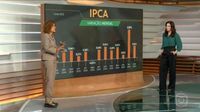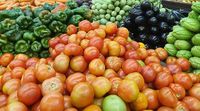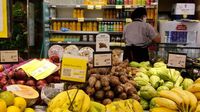On April 11, 2025, the Brazilian Institute of Geography and Statistics (IBGE) reported that the National Consumer Price Index (IPCA) rose by 0.56% in March 2025. This marks a significant deceleration from the previous month, which saw a 1.31% increase. The overall inflation rate has accumulated to 5.48% over the last twelve months, surpassing the 5.06% recorded in February.
The latest figures indicate that all groups of products and services experienced price increases in March, with the Food and Beverages category standing out. This group saw a notable rise from 0.70% to 1.17%, contributing an impact of 0.25 percentage points to the overall index. According to IBGE, food and beverages accounted for 45% of the total inflation index for the month.
Among the most significant price hikes were tomatoes, which surged by 22.55%, ground coffee, which increased by 8.14%, and chicken eggs, which rose by 13.13%. Together, these items were responsible for approximately a quarter of the inflation observed in March. Fernando Gonçalves, the manager of the research, explained, “For tomatoes, the heat of the summer months accelerated maturation, leading to an earlier harvest in some areas. Without these harvest areas in March, supply decreased, bringing upward pressure on prices.”
Ground coffee has seen a staggering increase of 77.78% over the past year, driven by international market price increases due to reduced supply from Vietnam, compounded by adverse climatic conditions affecting local production.
The Transport group also contributed to inflation, rising by 0.46% and accounting for a 0.09 percentage point impact. The increase in airfare from a significant drop of -20.46% in February to a rise of 6.91% in March was particularly noteworthy. Conversely, fuel prices showed signs of deceleration, with gasoline rising by only 0.51% compared to 2.78% in the previous month. Diesel oil and ethanol also registered lower increases, and urban bus fares fell by 1.09% due to adjustments in several cities.
Personal expenses reflected the second-highest variation at 0.70%, primarily driven by entertainment costs, as cinema, theater, and concerts spiked by 7.76% following the end of a promotional week in February. Meanwhile, the Housing group, which had previously surged by 4.44% in February, saw a much smaller increase of just 0.24% in March. This was largely due to a significant slowdown in residential electricity prices, which dropped from 16.80% to 0.12%.
In terms of regional variations, Curitiba and Porto Alegre reported the highest inflation rates for March at 0.76% each, primarily influenced by rising gasoline prices. In contrast, Rio Branco and Brasília experienced the lowest inflation rates at 0.27%, aided by significant decreases in airfare and urban transport costs.
In addition to the IPCA, the National Consumer Price Index (INPC), which tracks inflation for lower-income families, rose by 0.51% in March, following a 1.48% increase in February. Over the past year, the INPC has accumulated a rate of 5.20%, up from 4.87% in the previous twelve months. The pattern mirrored that of the IPCA, with food prices accelerating while non-food items showed signs of slowing down.
Despite some relief in the month-to-month comparison, the ongoing inflationary pressures on food and services are likely to keep the Central Bank on alert regarding future monetary policy decisions. The accumulated inflation remains above the Central Bank's target ceiling of 3%, which allows for a tolerance of 1.5 percentage points up or down.
Analysts had anticipated a monthly increase of 0.54% for the IPCA in March, with projections suggesting a 5.46% rise in the accumulated annual rate. The actual figures, however, surpassed these expectations, indicating persistent inflationary pressures in the Brazilian economy.
As the country navigates these economic challenges, the focus will remain on how food prices, particularly those of essential items, will affect consumer behavior and overall economic stability. The next IPCA results, which will reflect April's inflation, are scheduled to be released on May 9, 2025.








